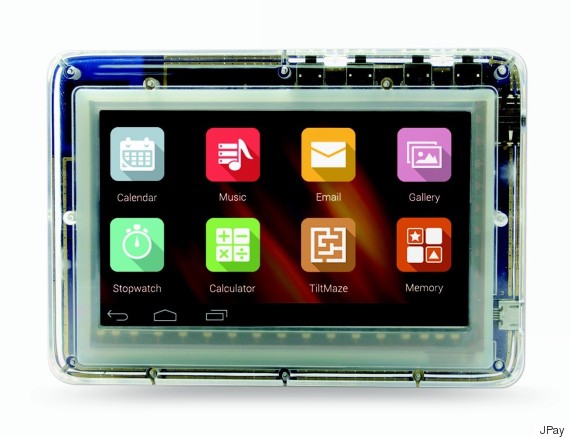
Remember when Piper found a flip phone hidden in the wall of the prison bathroom in "Orange is the New Black," season one? Well, this new gadget for inmates is certainly better than a contraband flip phone: It’s made to suit U.S. prisons’ security standards, and it's aimed at combating recidivism.
JPay, a Florida-based telecommunications company offering email, phone and money-transferring services to inmates in county jails, private federal prisons and state facilities, on Thursday announced the launch of its new JP5mini tablet. The 4.3-inch device runs on a customized version of Android and can send emails, take photos and connect to WiFi in facilities that are transitioning to wireless networks.
In August, JPay plans to introduce an app store, which would allow inmates to download games and educational apps.

Each tablet is made of clear plastic -- to deter inmates from smuggling contraband inside the device -- and safeguards against theft by assigning an individual number and password associated with the inmate user. In addition, the device is configured so that no other operating system can be installed.
Connections to the outside world are tightly controlled. Prison authorities must grant an inmate permission to connect via their tablet, and messages created on the device must be vetted before they're sent. As Yahoo Tech reports, the prisoner "must then sync the tablet at a designated kiosk," where "outgoing messages are then automatically submitted to supervisors for review. If it’s harmless, it’ll be forwarded to recipients. If not, it won’t make it beyond the prison walls."
Inmates and their families can purchase the JP5mini for about $70. The device is allowed only in prisons where JPay has an existing contract, though the company did not offer details on how many facilities it partners with.
JPay, which serves more than 1.9 million offenders in 34 states, has invested heavily in tablets for inmates. The company says the devices allow inmates to connect with their families and stay in touch with the outside world.
"This tablet, combined with our current reach, has the capacity to truly rehabilitate offenders on a massive scale," Ryan Shapiro, CEO of JPay, said in a press release. "We believe a real change is coming to corrections and we are excited to be at the forefront."
The JP5mini builds on the success of JPay's previous tablet release, the JP4. Jade Trombetta, a spokeswoman for the company, told HuffPost that the the JP4 has been used by 60,000 inmates, though it lacked the wireless capabilities of its new cousin.
The release of such devices is part of a larger technological transformation in America’s correctional facilities. Just a few years ago, one 15-minute interstate phone call could cost an inmate as much as $17. Today, several prisons and jails across the nation have begun to allow technology for inmates.
In 2013, for example, Pigeonly -- a Las Vegas-based startup founded by a former inmate -- launched a prison-friendly photo-mailing platform, as well as a service to cut down the price of phone calls to and from correctional facilities. In 2014, more than 100 prisoners in San Francisco were given tablets as part of a two-year educational program aimed at bridging the digital divide that many former inmates experience when they re-enter the workforce.
In addition, research shows that communication with friends and family on the outside -- which JPay's prison tablet program offers -- can help reduce recidivism. About three-quarters of former U.S. inmates were arrested for a new crime within five years of release from prison, according to a special report published by the Bureau of Justice Statistics. Isolation is often one of the leading causes behind high recidivism rates.
"[Incarcerated] people who maintain supportive relationships with family members have better outcomes -- such as stable housing and employment -- when they return to the community," according to a study by the nonprofit Vera Institute.
With JPay’s tablets, inmates can send 30-cent e-cards, in addition to standard emails, to their loved ones.
Over 3,000 JP5mini devices have been ordered already by inmates or their family members, and the tablets soon will find their way to four facilities in New Jersey and 14 in Idaho, Trombetta said.
Shapiro previously told Yahoo Tech that he thinks these tables will "replace [prison] phones eventually."
Sorry, Piper.
This post has been updated to include information about how prison authorities vet outgoing messages created on these tablets.
